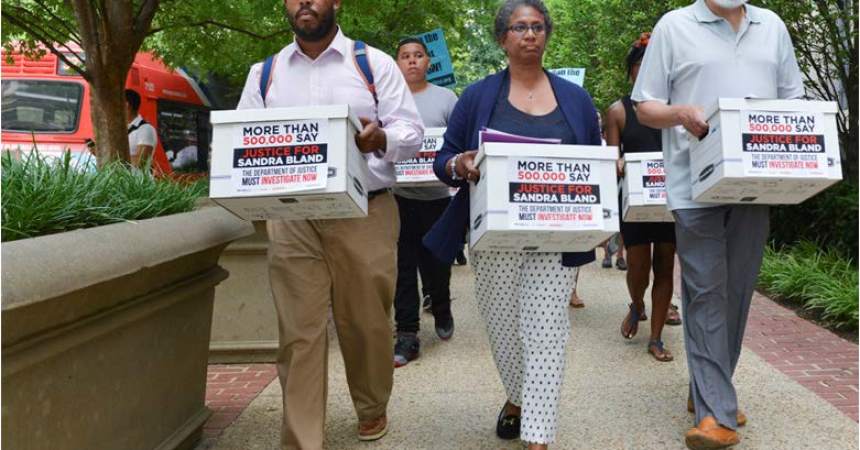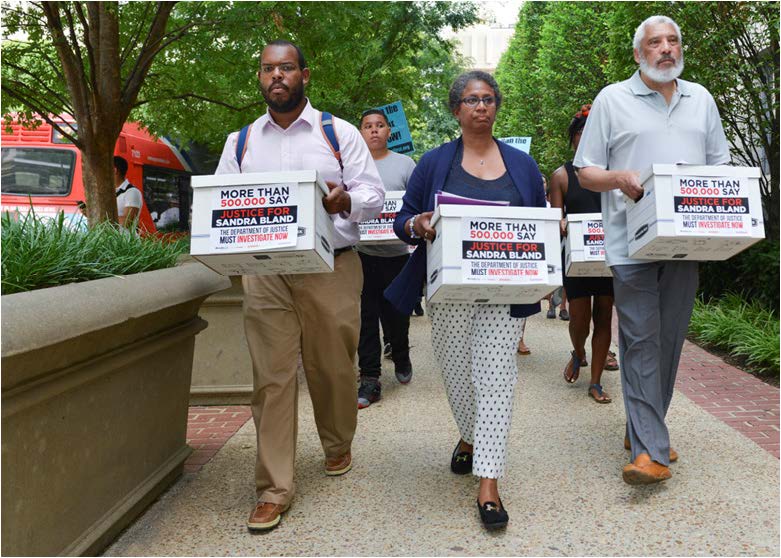
Civil Rights Groups Demand Federal Investigation into the Death of Sandra Bland

(Left-Right) Eugene Puryear of the Stop Police Terror Project in Washington, D.C., Lois Wilkins, the Freeland, Mich., resident and mother of four who started the petition on MoveOn.org, and Reverend Graylan Hagler, the senior pastor of the Plymouth Congregational United Church of Christ carried boxes of signed petitions to the visitor’s entrance of the Department of Justice.
Photo Courtesy of Freddie Allen/NNPA News Wire
By Freddie Allen
NNPA SeniorWashington Correspondent
A broad coalition of civil rights groups delivered more than 500,000 signed petitions to the Justice Department (DOJ), demanding that Attorney General Loretta Lynch launch a full investigation into the death of Sandra Bland and into the practices and policies of the Waller County, Texas Police Department and the prosecutor’s office immediately.
While visiting Prairie View A&M University, a historically Black college and university (HBCU), in preparation for taking a job there, Bland, a 28 year-old graduate of the school, was pulled over for a minor traffic violation on July 10. That traffic stop escalated to an arrest and on Monday, July 13, Bland was found dead in a Waller County jail cell.
As news spread of Bland’s mysterious death while in police custody spread across social media, civil rights groups decried another example of driving while Black and police brutality.
The #IfIDieInPoliceCustody hashtag trended on Twitter following Sandra Bland’s death.
During the press conference about the petition last Thursday, Lois Wilkins, a Freeland, Mich. resident and mother of four who started the petition on MoveOn.org, recounted a conversation that she had with her daughter Ebony Joy, who felt a strong connection with Bland’s life and tragic death. Ebony also admired Bland’s work as an activist and her decision to return to her alma mater to mentor the next generation of Black leaders.
“She said, ‘Mom, I could have been Sandra Bland,’” Wilkins remembered, “‘And if I die in police custody, I want you to know that I did not commit suicide.’”
Wilkins continued: “It was at that moment that I had no choice but to act.” Wilkins, who described herself as an educator and a small business owner, said that she started the petition because it is time for change.
“As an African American mother, I am appalled at the stealing of our children and our future leaders and this is totally unacceptable to me,” said Wilkins.
Eugene Puryear, who works with the Stop Police Terror Project in Washington, D.C., a group committed to ending racist, militarized policing in the U.S., said that activists don’t need to appeal to institutions, they need to transform institutions.
“The petitions are not just names on pieces of paper, they represent the power of a potential mass movement in this country that has already changed the conversation,” said Puryear, referring to the on-going dialogue about criminal justice reform.
Wilkins said that as a mother, she was tired of these untimely deaths at the hands of police officers and that she was also tired of being afraid for the lives of her four adult children.
“As a mother, I am sick and tired of being sick and tired,” Wilkins said, quoting Fannie Lou Hamer, the late Mississippi civil rights activist.
Rev. Graylan Hagler, senior minister of the Plymouth Congregational United Church of Christ and the executive director of Faith Strategies, a human and civil rights group in Washington, said that the abuse that Blacks suffer at the hands of police is nothing new. He said the only difference is that now everyone has a recording device in the palm of their hand, ready to expose police misconduct.
Bland attempted to record her interaction with Texas State Trooper Brian Encinia before he commanded her to put her cell phone down. However, another bystander managed to capture the encounter on video.
“If you look at the video of Sandra Bland closely, she was locked up, because she asserted her rights,” said Rev. Hagler. “The rights that anybody should have to ask the questions, ‘What are you doing? Why are you stopping me? Why are you arresting me?’”
Rashad Robinson, the executive director of ColorOfChange.org, an online civil rights organization focused on criminal justice and police reform, said that, from the beginning, Waller County officials have failed to expose the truth about what happened to Sandra Bland.
“From the police killings of Michael Brown, Rekia Boyd and the countless other Black victims of police violence, Waller County and Sandra Bland are no different,” said Robinson.
Elton Mathis, the district attorney for Waller County, said that the events surrounding Sandra Bland’s death will be investigated thoroughly. However, the county’s history of racial discrimination has left many activists doubtful that they will ever learn what happened to Bland between the time she was booked into the Waller County jail on Friday, July 10, and when she was found hanged on Monday morning, July 13 in her cell.
Waller County officials, who contend that Bland consumed a large amount of marijuana just before she was detained or while she was in jail and committed suicide by hanging herself with a trash bag, have released hours of video footage to dispel the myth that Bland was dead in her booking photo or that there was any foul play involved in her death.
The video footage from Bland’s arrest also showed that Trooper Encinia chose to escalate the encounter from a simple warning for failure to signal before a lane change to an arrest for assault on a police officer after he commanded Bland to exit her vehicle and she refused. After Encinia attempted to drag Bland out of her car and threatened to use his Taser on her while she sat in her car, she complied.
“What we know for sure is that police cannot police themselves, especially with a long history of racism,” said Robinson. “Her death was not an isolated tragedy. Waller County has serious problems with systemic racism.”
And those problems with racism span Waller County’s post-Civil War history.
Following the U.S. Civil War, at one time Waller County was home to a Freedmen’s Bureau office, protected by federal troops, and a Ku Klux Klan chapter, The Atlantic reported and the county’s population was majority Black according to the 1880 census.
When that majority population status flipped, Blacks lost any political power they had in the county. According to the Equal Justice Initiative, Waller County ranked third in the state for the number of Blacks lynched between 1877 and 1950.
Robinson said that Black residents make up 26 percent of Waller County, yet represent more than 50 percent of the jail population.
News outlets have reported that Waller County Sheriff Glenn Smith was suspended then fired in 2007 from his previous position as the chief of police in Hempstead, Texas for accusations of racial discrimination.
Clarise McCants, the campaign manager for UltraViolet, a women’s rights group, echoed Robinson’s concerns about police abuse and accountability.
“We know that there is a history of racism and violence in Waller County,” said McCants. “And what we know about Sandra Bland’s death shows that we can’t rely on Waller County to investigate Waller County.”
Robinson said that civil rights groups shouldn’t have to protest every time police kill a Black person, but in a rousing speech, Hagler urged the groups to soldier on.
“We’re standing up today and tomorrow and next week and for however long it takes,” said Rev. Hagler. “We need to keep our feet marching, we need to keep our spirits high, we need to keep our voices clear, we need to continue to demand justice.”
Justice Department officials accepted the signed petitions from the activists and told Wilkins that the Federal Bureau of Investigation is monitoring Waller County’s investigation into Bland’s death.
“I need to know what happened to Sandra Bland,” said Wilkins. “And so do the other 500,000 [people] that signed the petition.”








